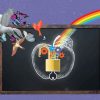Amid today’s wave of shark tanks, hackathons, and life-design workshops, innovation is clearly seen as a key ingredient for career and life success. Nowhere is this notion more prevalent than on university campuses, where innovation centers and maker spaces continue to proliferate.
“Industries are putting a premium on producing novel, useful ideas, and universities are building that into the curriculum,” says Jonathan Plucker, Julian C. Stanley Professor of Talent Development and associate dean at the Johns Hopkins School of Education. “What we’re really talking about is creativity.”
In 2004, confronting a growing variety of references to the term, he and a team of researchers set out to demystify creativity. Evaluating the term across peer-reviewed business, education, psychology, and creativity journal articles, they emerged with a standard definition:
“Creativity is the interaction among aptitude, process, and environment by which an individual or group produces a perceptible product that is both novel and useful as defined within a social context.”
In the quarter century since that meta study’s publication, Plucker and his team’s definition has proven durable. This year, the new edition of his award-winning book, Creativity and Innovation: Theory, Research, and Practice, brings together some of the world’s foremost thinkers and researchers to offer the latest insights on creativity, innovation, and entrepreneurship.
The team is especially excited about their work with artificial intelligence and creativity assessment. “Measures of creativity are notoriously difficult to score because participants are usually asked to provide multiple answers in response to each question,” Plucker explains. “Machine learning shows promise in lowering both the difficulty of scoring and the time it takes to return results to parents and teachers. This should allow us to scale our creativity assessments to whole states or even countries, which is currently impossible.”
Industries are putting a premium on producing novel, useful ideas, and universities are building that into the curriculum. What we’re really talking about is creativity.

